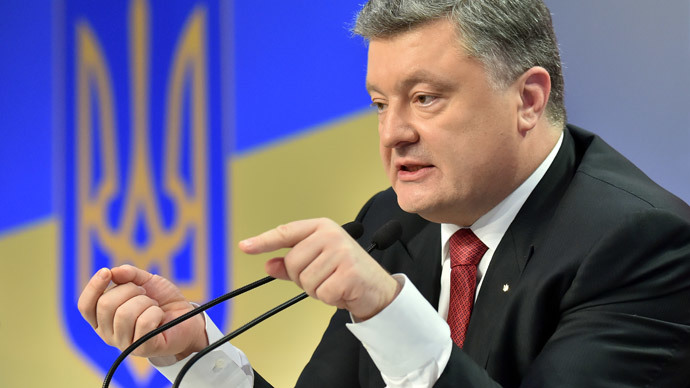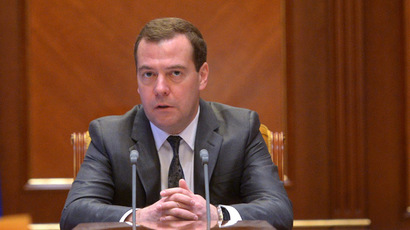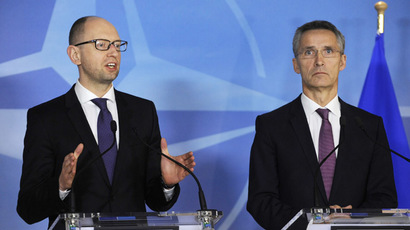Ukrainians ‘to deliberate’ NATO membership in 5 years – Poroshenko

Signing a bill repealing Ukraine’s nonaligned status, President Petro Poroshenko said the nation will be able to consider NATO membership within five or six years.
Poroshenko held an end-of-year press conference in Kiev on Monday after signing a series of bills, including the repeal of the 2010 non-alignment law passed by the Ukrainian parliament last week.
Answering a question about whether Ukraine will hold a referendum on NATO membership in 2015, Poroshenko said: “The Ukrainians will deliberate on that in five or six years.”
A series of reforms will have to first be implemented for the country to meet NATO and EU standards, he said.
NATO Secretary General Jens Stoltenberg outlined some of the criteria that Ukraine would have to meet before joining the bloc. Firstly, it would have to eliminate corruption within the regime and improve the efficiency of the state apparatus, he told Norwegian TV.
Stoltenberg also said that the possibility of deteriorating relations with Russia should not deter Ukraine from joining the alliance.
Last week, Russia’s deputy defense minister, Anatoly Antonov, warned that Ukraine’s accession to NATO would put an end to NATO-Russia ties.

‘No military solution for eastern Ukraine crisis’
Poroshenko told reporters that a meeting between Russia, France, Ukraine, and Germany is planned for January 15 to discuss the crisis in the country’s east. He said that he does not foresee creating an alternative to the Minsk agreement, which was signed in September but did not deliver the immediate ceasefire it promised.
“There is no military solution to the conflict,” the president said.
Poroshenko said he believes the fragile ceasefire is working slowly, but needs to be strengthened.
He added that Kiev will not compromise “the territorial integrity of Ukraine,” including the contentious status of Crimea and the Donbass region.
In a March referendum, largely condemned by the international community, Crimeans voted to join the Russian Federation. Rebel leaders in Donbass do not recognize the legitimacy of the Kiev regime.
The latest negotiations, intended to cement a lasting ceasefire, began in Minsk on Wednesday last week – but they were called off two days later when they failed to make significant progress. However, both sides agreed to exchange hundreds of prisoners.
The head of the Lugansk People’s Republic (LPR) said on Monday the he does not expect the meeting planned for January 15 in Astana to yield better results.
“Knowing how Ukraine treats these sorts of negotiations, I’m not so sure that any serious progress will be made,” said Igor Plotnitsky.
More than 4,700 people have died as a result of the conflict in eastern Ukraine, according to UN figures released on Monday.














